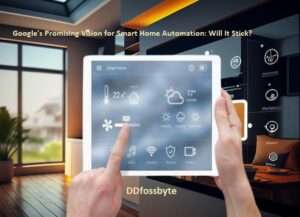In the ever-evolving landscape of smart home automation, Google has recently unveiled a vision that has caught the attention of tech enthusiasts and homeowners alike.

The question on everyone’s mind, however, is whether Google can sustain its momentum and deliver on this exciting promise.
The Challenge of Home Automation
Setting up and managing smart home devices has often been a daunting task for consumers. The fragmentation of the market, compatibility issues, and the sheer variety of devices available can overwhelm even the tech-savviest among us. It’s a space where simplicity and convenience are paramount, and this is precisely where Google aims to make its mark.
Google’s Fresh Approach
In a surprising turn of events, Google seems to have found a potentially game-changing solution for smart home automation. Their new approach focuses on the integration of services and devices under a unified ecosystem. This approach, if executed effectively, could significantly simplify the user experience.

The Importance of Integration
One of the major pain points in home automation has been the lack of seamless integration between different devices and platforms. Consumers often find themselves juggling multiple apps and struggling with compatibility issues. Google’s proposal aims to eliminate these headaches by providing a cohesive ecosystem where everything just works together.
A Glimpse into the Future
Imagine a future where your Google Nest thermostat, Nest Hub, and Chromecast seamlessly communicate with one another. Your lights, security system, and even your kitchen appliances all sync effortlessly. Google’s vision promises this level of integration, making it easier for users to control and monitor their smart home from a single interface.
The Role of Google Assistant
Central to Google’s strategy is the integration of Google Assistant, their virtual voice-activated helper, into the heart of the smart home ecosystem. This means users can control their devices, answer questions, and even automate tasks simply by speaking to their Google Assistant.
Privacy and Security Concerns
While Google’s vision for smart home automation is undoubtedly promising, it also raises concerns about data privacy and security. As Google integrates more devices into its ecosystem, the amount of user data collected also increases. It will be crucial for Google to address these concerns and ensure that user information is handled with the utmost care and security.

The Road Ahead
The success of Google’s vision for smart home automation will ultimately depend on execution. It’s one thing to propose an integrated ecosystem, but delivering on that promise is a complex endeavor. Google must work closely with device manufacturers, ensure ongoing software updates, and maintain a high level of user satisfaction.

Additionally, Google is introducing “Help me script,” a code automation tool that translates natural language commands into Google Home scripts. For instance, users can say, “When I arrive home and the garage door closes, turn on the downstairs lights,” and the tool will create the necessary script. These features aim to simplify the setup and use of smart home devices, making it more accessible to a broader range of users.

Google is trying to make home automation easier with its Matter initiative. Matter is a new smart home standard that aims to unify all of the different smart home devices and platforms into a single ecosystem. This would make it easier for users to set up and manage their smart homes.

In a world where the smart home market is becoming increasingly crowded, Google’s fresh approach to integration and simplification stands out as a beacon of hope. If Google can effectively deliver on its vision for smart home automation while addressing privacy and security concerns, it may indeed revolutionize the way we interact with our homes. As consumers, we can only hope that Google sticks to its promise and leads the way to a more convenient and connected future.
